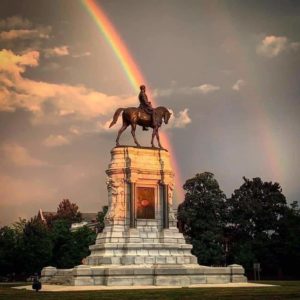
For every Southern boy fourteen years old, not once but whenever he wants it, there is the instant when it’s still not yet two o’clock on that July afternoon in 1863, the brigades are in position behind the rail fence, the guns are laid and ready in the woods and the furled flags are already loosened to break out and Pickett himself with his long oiled ringlets and his hat in one hand probably and his sword in the other looking up the hill waiting for Longstreet to give the word and it’s all in the balance, it hasn’t happened yet, it hasn’t even begun yet, it not only hasn’t begun yet but there is still time for it not to begin against that position and those circumstances which made more men than Garnett and Kemper and Armistead and Wilcox look grave – yet it’s going to begin, we all know that, we have come too far with too much at stake and that moment doesn’t need even a fourteen-year-old boy to think This time. Maybe this time with all this much to lose than all this much to gain: Pennsylvania, Maryland, the world, the golden dome of Washington itself to crown with desperate and unbelievable victory the desperate gamble….[from Intruder in the Dust, 1948]
[Back in late 2018 Scuppernong Press published a volume of my essays on the South and Southern history titled The Land We Love: The South and Its Heritage (available via Amazon and most other booksellers). I have been gratified by the reception given to this volume and by the many positive reviews. Below I share my Introduction to the book which I believe can stand on its own as a statement of my principles and of my commitment to my history, my region, and, as the poet Robert Lee Frost once said, “To the truths we keep coming back to.”]
Over the past several years I have been writing essays for several publications and media outlets regarding Southern and Confederate history and heritage, and, in particular, about the growing assault on the symbols of that history and heritage. None of what I wrote—nothing I put into print—should have seemed that unusual or radical. My thoughts and observations could have been put down on paper fifty years ago—even thirty years ago—and I don’t think they would have caused much of a stir or raised an eyebrow for most readers. Of course, much has changed in fifty years, and what was admired, revered, and considered normal then, is, in large part, considered controversial, even hateful, or subject to censorship and banning, now.
More @ The Abbeville Institute

No comments:
Post a Comment